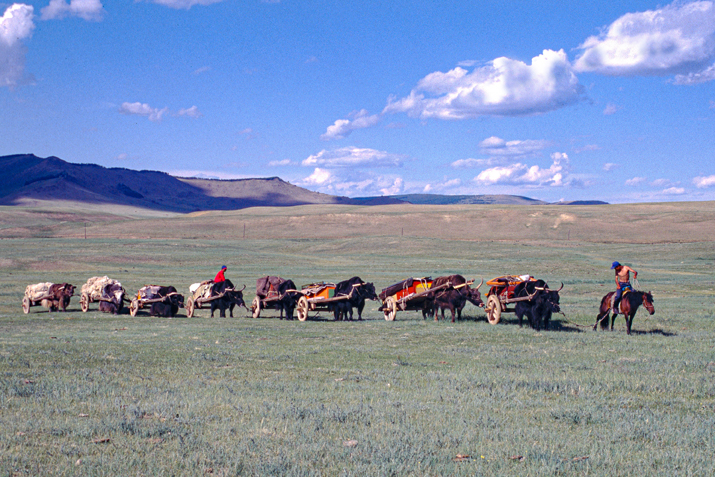
Prison camp and Bilgee changes his mind
N 49°38'671'' E 100°11'496''
Day: 85
Sunrise:
07:42
Sunset:
18:26
Total kilometers:
777
Soil condition:
Dust/gravel
Temperature – Day (maximum):
20°C
Temperature – day (minimum):
15°C
Temperature – Night:
minus 4°
Latitude:
49°38’671”
Longitude:
100°11’496”
Maximum height:
1220 m above sea level
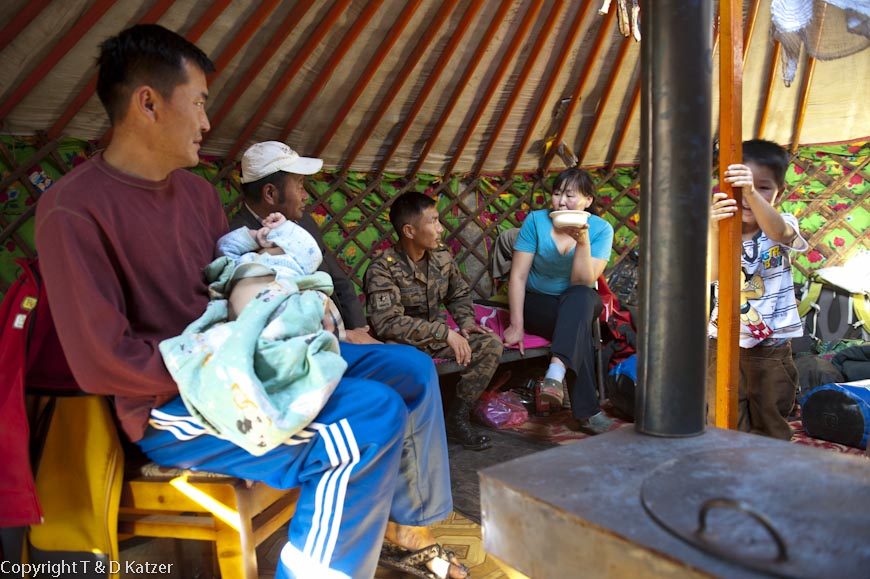
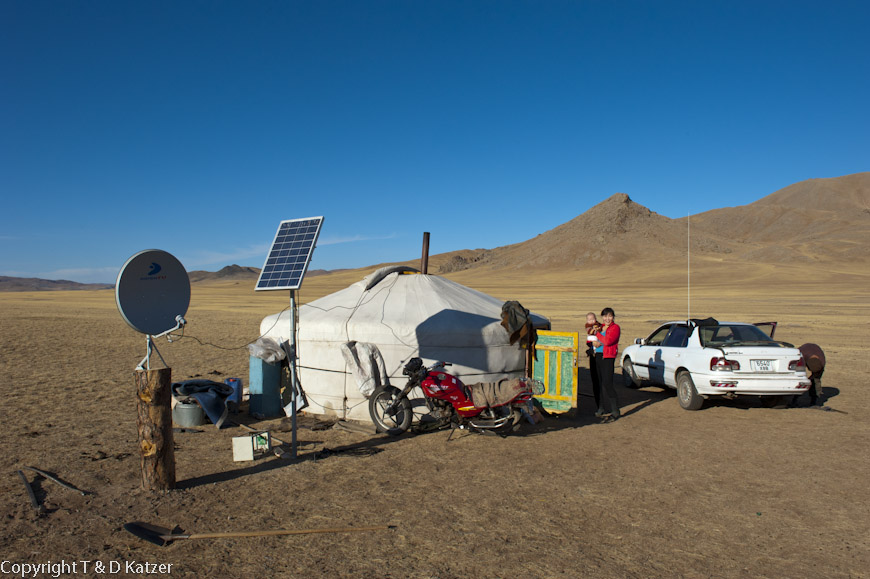

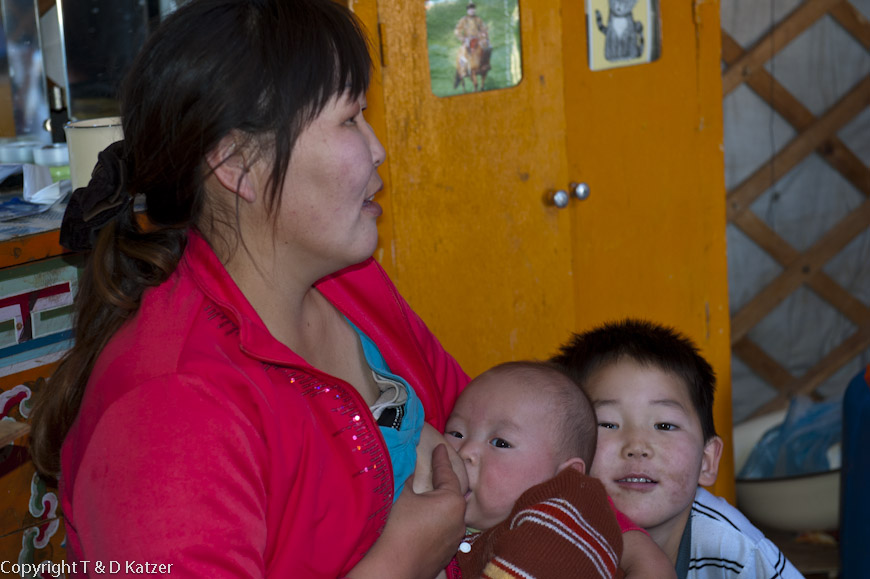
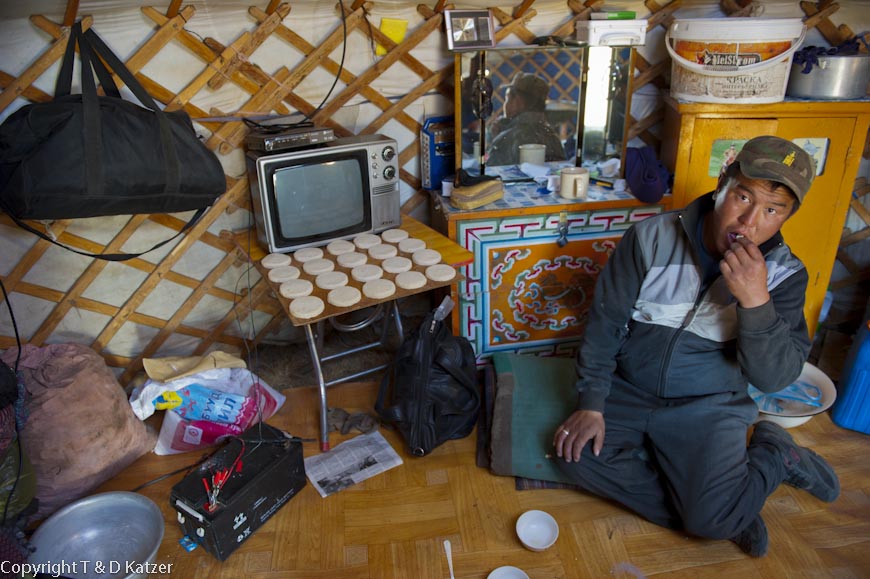
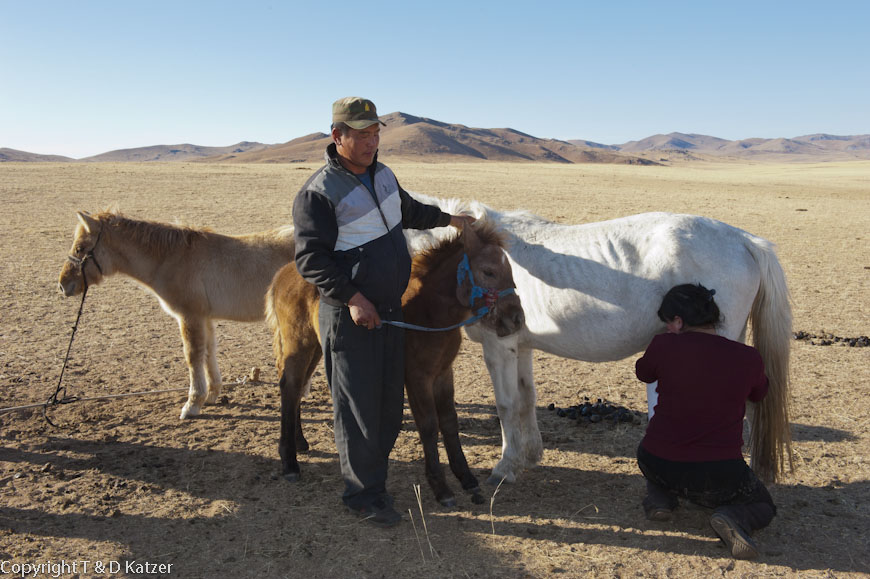
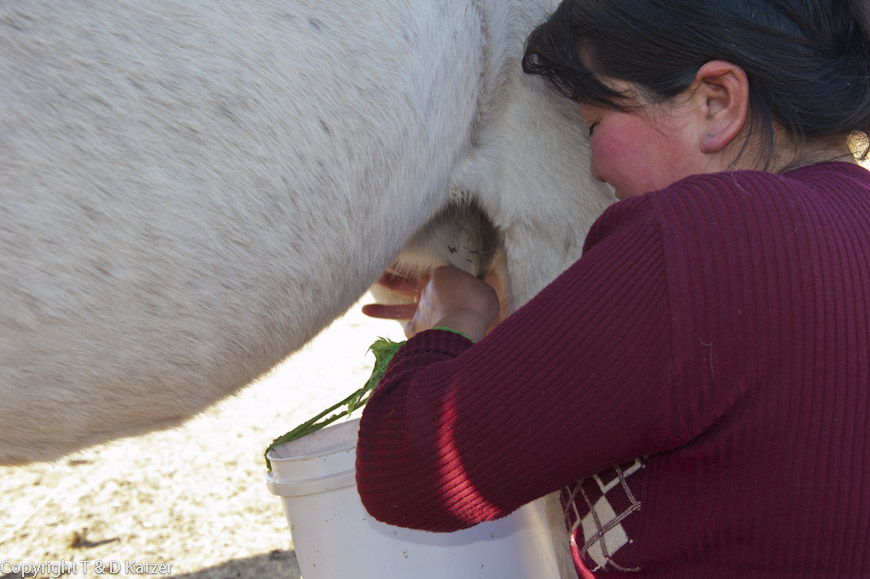
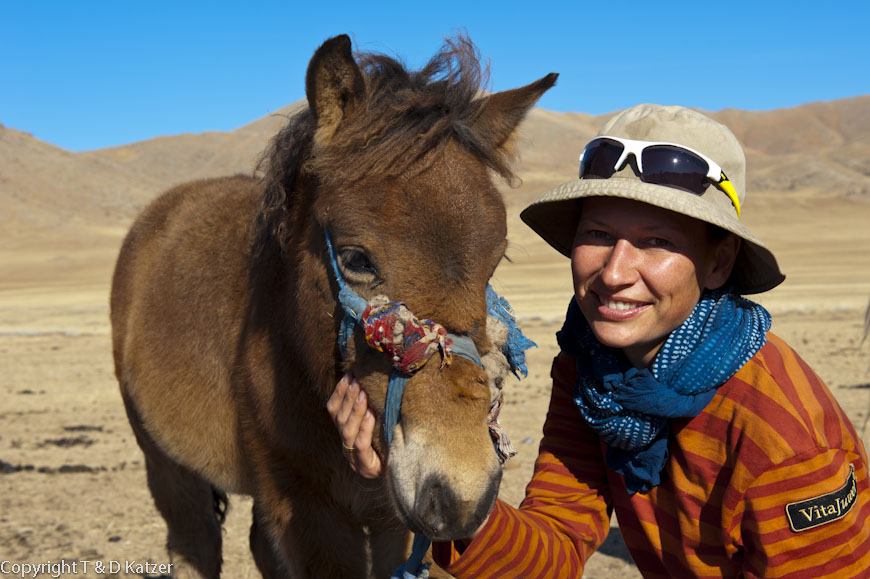
At night, I toss and turn from one side to the other. I can’t get my head around how and whether we are allowed to stable our horses in the Mörön prison? Suddenly I have a dazzling idea that barely lets me fall asleep. When Saraa comes to the yurt in the morning to discuss the next steps with us, I tell her about my thought process. “What do you say we donate 1 million tugrik (€571) to the prison? The prison warden said he needed 17 double-glazed windows for the building. If a window costs 80,000 tugrik, he gets 12 ½ windows for our donation. That would be 1 ½ floors that he could equip before the coming winter. We handle the whole thing through your NGO. In return, the military will look after our six horses. It would be a fantastic win-win situation. After three years of searching, the prison warden finally has most of his windows. He can also score a success with his superiors in Ulan Batar, which is certainly good for his career. The prisoners no longer have to freeze in the terribly cold winters. Your NGO could prove a real success to its members, which would also explain why you invited us to Mongolia. We would accommodate our horses and they would only have to walk 300 km instead of 700 km to be allowed to take a winter break after the exhausting trip. What do you think?” I ask excitedly, awaiting her answer. It takes a while for Saraa to grasp the full extent of my words. Then a smile appears on her lips. “Denis! That’s a brilliant idea. What’s more, as Germans, you made the start. This will motivate some of my NGO members to donate more windows or at least find the remaining amount. I immediately call the prison warden, Major Batjargal. Perhaps he will have time to pay us a visit this morning. That way we wouldn’t lose any time and could talk about further details.
1 ½ hours later, Major Batjargal is sitting in our yurt with another senior officer, the head of finance for the region. We submit our offer, which immediately meets with an open ear. “We will pay them 500,000 tugrik (€286) tomorrow. They will get the rest when we pick up our horses in May of next year. As we have heard, the military has its own horses and cattle. If they take our animals into their herd, they won’t even have any additional personnel costs,” I conclude. Both officers nod affirmatively and can hardly believe what I have just suggested to them, at least that’s how he seems to us. “If you like, you can visit the place where we keep our animals this afternoon,” suggests Major Batjargal. “Gladly,” Tanja and I reply. After the officers have left us, Saraa immediately organizes a cab to take us to the yurt camp of the prison.
We leave Mörön at 14:00. We find ourselves crammed into the passenger compartment of the car as it thunders over countless potholes, hollows and rough stones. Saraa sits with her baby Erkhenbayar on the completely worn-out passenger seat. Her husband Gonchig has squeezed into the back seat to the left of me. His four-year-old hyperactive son Ontsgoibayar fidgets up and down on his lap. Tanja tries to fight against falling on top of me on my right. The 53-year-old friend of Saraa and Gonchig, Ringhineazar, who has tattoos on his arms and hands, wildly moves the steering wheel back and forth. He stares through his glasses at the completely dirty windshield. The dried rubber of the windshield wiper blade occasionally smears the dust on the broken windshield. A large droplet hangs from the tip of the tattooed man’s nose and keeps trying to land on the steering wheel. Suddenly it starts to stink terribly. Bright smoke billows out of the hood. The machine slows down, stutters even more than before, until it gives up the ghost. “Oh no. I thought we’d be back in an hour and now we’ve probably broken down,” I groan. We all get out and enjoy the wonderful scenery while the driver pours fresh water into the radiator. Then the trip to hell continues. To cut a long story short, the tattooed man leaves the slope and drives his old, incessantly rattling and clattering car across the completely dry meadow. “And our horses are supposed to find something to eat here? Every square meter is dead,” Tanja asks aloud. “The further out we get, the better it will be,” I am convinced. Coarse stones hit the floor panel. Now I know what Saraa meant when she said: “There are very few cab drivers who can be booked for a ride outside of Mörön. The roads and tracks are too bad and nobody wants to destroy their car.” There is no doubt that a normal car is not built for such a surface. I wonder how this old box is still making any progress at all. We cross a river. The water sloshes through a gap in the driver’s door. Then the heap of metal puffs up a hill, panting, only to come out of its last hole at the top. We stop again. Water is poured into the radiator again. After about an hour and around 30 km, we reach two completely normal-looking yurts. “This is the prison camp,” says Officer Gonchig, pulling open the door and jumping out of the tin box with his son. We cough a little because of the smoke in the passenger compartment. While the driver works on the smoking engine, we are invited into the yurt. “And this is a prison yurt?” I wonder. “Yes, there are prisoners out here who have done well and are about to be released. They help with tending the herd, milking the mares, slaughtering the animals and all the work that has to be done out here,” explains Saraa. “Well, that’s not what I imagined. I thought we’d come to a big prison with a wall around the outside and now we’re in a normal yurt,” Tanja replies. We are welcomed in the yurt by a man and his wife. The shepherd is an employee of the prison. We learn of his officer rank and that he also usually wears a uniform out here. Gonchig works with him and introduces us. He explains our request. “If our boss thinks it’s good and has ordered it, it’s my pleasure to look after your horses with my men. Don’t worry about them. We will feed them well. In a few weeks we will move to our winter camp. There’s plenty of grass in the pastures there,” he explains. His exceptionally hospitable wife, a qualified doctor, immediately offers us fresh milk tea, home-made cheese and boortsog (yeast dough balls fried in oil). Saraa explains that it is important to have a doctor out here. That’s why the combination between the shepherd officer and his wife is ideal. “Why don’t you come with us? We’ll show you how we milk our mares,” the shepherd invites us to leave the yurt. Outside, he shows us his animals and how he and his wife milk the mares. To do this, he always ties the mare’s foal to a rope stretched along the ground and leads it to its mother. It may suck a little on the teats to stimulate them. Then it is immediately taken away and the shepherd’s wife milks the little bit of milk into a bucket. It is laborious work to extract the precious milk in this way. “We do this every few hours. So it’s no problem to get enough milk,” explains the supervisor. One of the prisoners is standing next to us. For him, too, the visit from Europeans is something out of the ordinary. He extends his hand to us in a friendly manner. Then he disappears into the second yurt to cook for us, the guests. Back in the yurt, the prisoner brings a large wog of noodles and mutton. Our bowls are filled to the brim. “Hm goja”, (“Hm good”) we praise.
Ringhineazar has now brought his hissing engine under control and is also sitting in the yurt. He smiles at the group and begins to talk openly and candidly about his youth. “I was only 14 when my father died. He was a strict man who always wanted me to lead an honest life. After his death, nothing held me back. Even my mother had lost all power over me, which is why I set out to explore the big wide world. Of course, I didn’t get very far. I got stuck in one of the first villages. I had no job and no idea how to get one. I sneaked around the market a lot and stole here and there. My pride and joy was a knife which I carried openly to show everyone how dangerous and strong I was. My God, what a boy I was. If my father had seen that. Then I was caught and given a warning. But I didn’t give a damn. I continued to steal my way through life until I was caught again and ended up in prison. What a career. As an incorrigible and obviously not very good thief, I was caught red-handed several times over the years and repeatedly thrown into prison. I know places like this one too well,” he laughs. “Today I am happily married and have two children of my own. I’ve been living an honest life for a long time. Thank God for that. Now it’s my turn to continue my father’s job in order to give my children a better future,” he adds in a good-natured tone, interrupted by chewing the food served.
“You absolutely have to try Mongolian vodka,” says Gonchig. “Gladly”, I reply, whereupon the doctor hands me a cupful. I taste it carefully and am surprised by the mild yet strong taste. Saraa explains that Mongolian vodka is made from fermented mare’s milk. It is a kind of milk schnapps (nermel arkhil). Before we say goodbye again, we agree with the warden to feed our horses an additional two truckloads of hay over the winter. A load costs 150,000 tugrik (€86), explains the supervisor. We later give the money to Saraa who promises to supervise the hay feeding. With full bellies and happy about the good agreement, we bump the 30 km back to Mörön.
Bilgee changes his mind
It is already 6 p.m. when we reach our yurt. Bilgee is already there or not yet in the pasture with the horses. I wake him up in a friendly manner. For the first time since we’ve known him, he wakes up in a bad mood. He leaves the yurt without comment and saddles his horse. “Do you want to spend the night outside tonight too?” I ask in surprise. “The horses need to eat,” he grumbles. I wonder about his behavior. What has happened? The atmosphere is seriously unpleasant. We actually wanted to tell him the good news that we had found a fantastic wintering place for our horses. “Bilgee, is everything okay?” I ask anxiously. “Yes, yes,” he replies. “It looks like we’ve really managed to organize everything. We have permission from the border troops to stay there. We have a letter of recommendation from the mayor. Our relocation to Osttaiga has been confirmed in writing. We have all our food and equipment together and, best of all, our horses have a fantastic place to spend the winter,” I tell them using sign language, a little Mongolian and the help of our language guide. “Good,” he says without smiling or looking happy as usual. “Something’s up,” I whisper to Tanja as Bilgee straps the saddlebags onto Tenger’s back. “Do you think so?” “Absolutely. Something’s coming,” I continue to whisper, feeling the unpleasant mood literally choking me. “I’d best get Saraa in. Have her translate my words again. Who knows, maybe he misunderstood something?” I say and walk to the log cabin. A little later, Saraa is in the yard and translates sentence by sentence what we have just been told and the good news that we will finally be able to set off tomorrow. Bilgee sounds patient. He thinks about it for a while. Then comes the hammer. “I will not ride your horses from Tsagaan Nuur to Mörön,” we hear his words through Saraa’s mouth. As if we’d just been struck by lightning, we stand there and stare at our otherwise lovable horse man. I gasp for air and try to regain my speech. “Why?” the word squeezes through my lips. “You’ve made an agreement with the military. Let them take care of getting the horses back,” he replies, visibly offended. “What, the military? They won’t give us a soldier to ride our horses back. That’s an absurdity. And what does that have to do with our agreement? You promised to bring the horses back. We leave tomorrow. Everything has been prepared down to the last detail,” I explain, whereupon Saraa can hardly keep up with the translation. “I’m not bringing the horses back,” is his determined reply. “Bilgee. What were we supposed to do? We had to find an alternative and we are very happy to have found one in such a short time. We can’t pay 5.7 million Tugrik just to get horses worth 2.8 million through the winter! We told you that and you understood it. And now you change your mind?” I say with as much control as is possible in a situation like this. “Yes,” he answers dryly. “If the military can’t bring the horses here, you should sell them up there,” he suggests. “I don’t want to give up my Naraa,” Tanja replies. As I don’t want to sell my excellent riding horse Sar and have grown fond of the whole team of horses, the thought of selling them makes me extremely uncomfortable. “We can buy new horses next year. That would be the cheapest solution anyway,” suggests Bilgee. “Unfortunately, that’s not possible,” Saraa speaks up again. “Why?” I wonder. “Because no one up there will buy your horses. Hardly anyone there has any money. Above all, nobody needs horses there. I once sent my cousin Ayush a tourist who rode around the region around Tsagaan Nuur for a few weeks with his own horses. In the end he wanted to sell them. However, it was impossible for him to sell the horses. He was so desperate that he sharpened his knife. When Ayush saw what he was doing, he wanted to know why he was sharpening his knife for hours. “If nobody here wants to buy my horses, then I’ll just kill them,” the man replied. Ayush was so shocked that he gave the foreigner 100,000 Tugrik and compensated the rest with souvenirs and blankets. Although the horses were definitely worth more, the American was satisfied with them. Ayush told me the story later and asked me never to send him such a crazy American again. “Ha,ha,ha,” we laugh despite the bad mood.
It is already dark when Bilgee sets off with our horses to seek out the grazing grounds outside the town. “Don’t wait for me. I won’t be back until tomorrow,” he says and disappears into the darkness. Tanja and I are really pissed off. “I’d really like to terminate our collaboration,” I say, not knowing once again what to do next. “Me too,” says Tanja. “But what do we do then?” “I don’t know.” “You do realize that Bilgee’s decision ends our horse trip in Mörön?” “What do you think? Of course I realize that. But there will be a reason for it. Bilgee is not the only man in the land of horses who can ride our animals back,” says Tanja. “That’s right. But we’re already behind schedule. We need a solution, preferably now,” I think.
Later, as we sit in our yurt and try to play through the various options, Gonchig comes in. “Saraa would like to talk to you. Will you please come to our log cabin?” he asks politely. “Gladly,” I say and follow him while Tanja oversees the stew on the potbelly stove. “We have a new idea,” Saraa begins the conversation. “A new idea?” “Yes.” “And what’s that?” I’m curious. “Gonschig thinks Bilgee has torn down the scaffolding of your trust. He is of the opinion that you should dismiss him. You never know when and at what point he will change his mind again. It’s good that he did it here and not while you were away. Gonchig has already set off to ask a relative to accompany you to Tsagaan Nuur and bring the horses back from there. What do you think of that?” “Sounds good. That would mean our expedition can continue. It would be much nicer for us to arrive up there in the north with the horses than with a four-wheel drive vehicle,” I reply. “We can fully understand that. That’s why we’re considering whether you want to continue with another horseman.” “Is he reliable?” “At least he has been so far. He has accompanied many a tourist group as a horseman. There have never been any complaints.” “Hm, we’d have to talk to him. Can he come by here?” “Of course he can. He’s one of our workers. He builds the log cabins with my brothers,” Saraa reports.
At 9 p.m., 27-year-old Tulgaa is sitting in Sara’s kitchen. His face looks serious. No smile flits across his lips. “And you would accompany us to Tsagaan Nuur?” asks Tanja, to which he nods. “You realize that winter is just around the corner and it can get very cold?” asks Tanja. “Ha, ha, ha,” he smiles for the first time. “I don’t mind,” is the expected Mongolian response. “Without wanting to offend you. A few people have already said that and then it got too cold for them,” I interject. “Not for me.” “Do you have a Winterdeel?” Tanja wants to know. “I don’t need a winter deel yet in mid-October. If it gets too cold for me, I can get a deel in Khatgal. I live up there,” he says with unwavering certainty. “And what do you intend to do about the horse theft?” asks Tanja and talks about our guard shifts. “Ha, ha, ha. Nobody steals horses from Tulgaa. Everyone knows me in this region. I don’t steal horses,” he replies again with such confidence that I have to wonder if there is someone sitting here who is a little too arrogant? “Okay, we’ll think about it and let you know tomorrow,” I reply after Tanja and I have conferred. We would like to thank Saraa and Gonchig for quickly finding a replacement and Tulgaa for his interest and coming.
We look forward to your comments!

